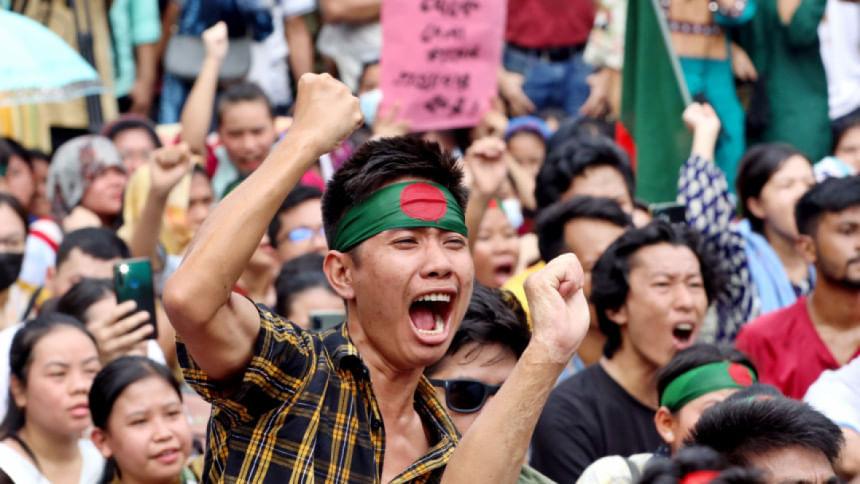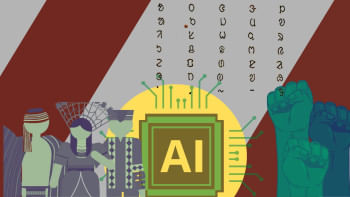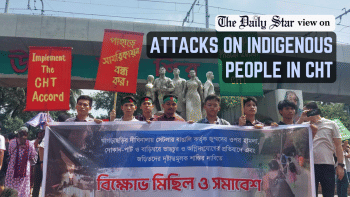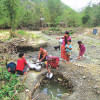Land rights can ensure the overall rights of indigenous peoples

The aim of the International Day of the World's Indigenous Peoples, observed annually on August 9, is to raise awareness and promote the rights, cultures, and unique contributions of indigenous populations worldwide. The day also serves to acknowledge the challenges indigenous peoples face and to strengthen international cooperation in addressing issues such as human rights, environmental protection, development, education, and health.
The UN Declaration on the Rights of Indigenous Peoples (UNDRIP), adopted in 2007 and supported by Bangladesh, along with the International Labour Organization's (ILO) Convention No. 107 on Indigenous and Tribal Populations, which Bangladesh ratified in 1972, form the basis for recognising indigenous peoples' rights in the country. Effective implementation of these rights also depends on national frameworks such as the Chittagong Hill Tracts Peace Accord, 1997 and the State Acquisition and Tenancy Act, 1950.
While past governments have expressed rhetorical support for the UNDRIP and have at times mentioned ILO Convention No. 169, Bangladesh has not ratified the latter. The rights to land, forests, natural resources, education, and cultural preservation are enshrined in ILO Convention No. 107. Given that Bangladesh is a state party to this convention, it bears legal responsibility to uphold and implement these provisions.
The reality is different, however. The traditional rights of Jumma people to their mouza and jhum-farming lands were taken away. The lands are now leased to companies from outside the CHT region and influential individuals, which is a direct violation of ILO Convention No. 107. The establishment of tourist centres, declaration of reserve forests, expansion of military oversight,and construction of roads are also taking away the Jumma people's traditional land rights in the CHT.
Similar violations of ILO Convention No. 107 include the destruction and occupation of Paanjum belonging to the Khasi community in Sylhet, declaration of a reserve forest in Madhupur without any discussion with or consent from the Garos, occupation of cremation grounds of the Rakhines in the coastal areas and eviction of their villages for the Payra port without any compensation, occupation and eviction of lands belonging to indigenous peoples in northern Bangladesh, and the initiative to establish an export processing zone in the Bagdafarm area of Gaibandha district, instead of returning the land to the indigenous Santal people as per agreement.
Recognising Bangladesh's indigenous peoples as "indigenous" in the constitution is the first, most critical step towards securing their rights. The ongoing constitutional reform presents a historic opportunity to do so, honouring their right to self-identification under the UNDRIP. But a name is not enough. This recognition must be backed by concrete constitutional guarantees for their rights to land, culture, and self-governance. Ultimately, international law protects their rights; whether they are called "tribal" or "indigenous;" the fight is for both the dignity of the correct name and the tangible rights that must come with it.
Many put forward excuses, saying recognising indigenous peoples as "indigenous" will threaten the sovereignty of the country. In this regard, Article 46(1) of the UNDRIP clearly states that "Nothing in this Declaration may be... construed as authorizing or encouraging any action which would dismember or impair, totally or in part, the territorial integrity or political unity of sovereign and independent States." Therefore, there is no possibility of the sovereignty of the country being threatened or undermined.
The framework of special governance for the CHT region lies in the proper implementation of the CHT Accord. The special governance system will become effective through the proper implementation of the three Hill District Council (HDC) Acts and the CHT Regional Council Act made in accordance with the CHT Accord. In this case, law and order, land management, forest and environment, tourism, secondary education, development of communication systems, etc must be entrusted to the HDCs.
According to the Regional Council Act, the CHT Regional Council is tasked with the comprehensive oversight of the region. Its duties include supervising the administration, security, and development functions of the three hill district councils and coordinating all local government bodies and NGOs. The council is also responsible for upholding indigenous law, issuing licences for heavy industry, and directing the CHT Development Board. Crucially, the act mandates that the central government must consult the council before enacting any laws of the CHT, establishing it as the principal authority for regional governance.
For the indigenous peoples of the plains, achieving cultural autonomy requires dedicated initiatives to preserve their unique customs, traditions, and languages. Their cultural heritage is inextricably linked to their ancestral lands, forests, and natural resources. Consequently, any meaningful effort to protect their culture must also guarantee their customary rights over these territories. A critical legal foundation for this is the proper and full implementation of the relevant sections of the State Acquisition and Tenancy Act, 1950.
Mangal Kumar Chakma is information and publicity secretary at Parbatya Chattagram Jana Samhati Samiti (PCJSS).
Views expressed in this article are the author's own.
Follow The Daily Star Opinion on Facebook for the latest opinions, commentaries and analyses by experts and professionals. To contribute your article or letter to The Daily Star Opinion, see our guidelines for submission.

 For all latest news, follow The Daily Star's Google News channel.
For all latest news, follow The Daily Star's Google News channel. 










Comments